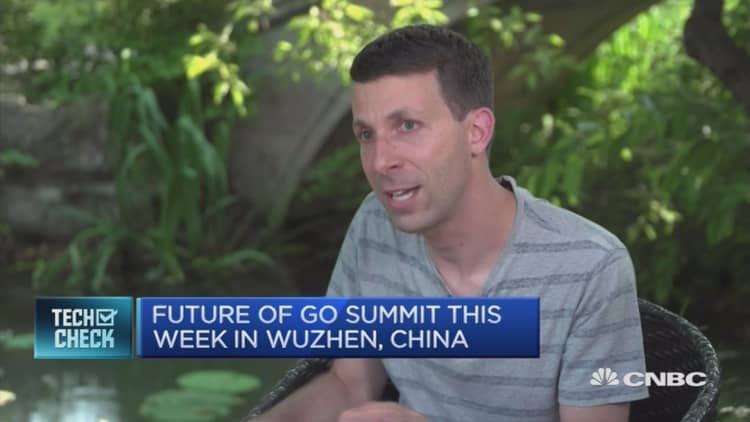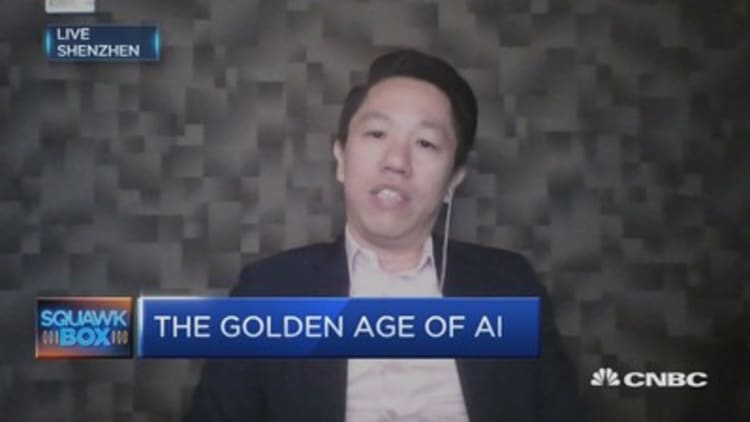WUZHEN, China -- It's man versus machine. The world's number one champion of the ancient Chinese board game Go is battling against a computer program built by Google in a set of three matches beginning Tuesday.
Chinese player Ke Jie, 19, is going up against machine AlphaGo, and the stakes are high. If he wins, he gets $1.5 million in prize money, and maintains his status as the world's top ranked master. But if he loses, it would mean machine domination over humans in one of the world's most complex board games, solidifying Google's significant strides in artificial intelligence.
"We're keeping pretty confident, I think, that AlphaGo is going to play well," Demis Hassabis, CEO of Google DeepMind, which created the machine, told CNBC.
"I'm just very excited to see actually what creative things Ke Jie is going to come up with and to see, to test the machine to its limits."
Teaching computers to master Go has been considered a holy grail for artificial intelligence scientists, as it's a complex game with more possible configurations of the board than there are atoms in the universe.
The game, which originated thousands of years ago in China, has two players taking turns placing black and white stones on a square board of 19 lines by 19 lines. The object is to take territorial control of the board by surrounding the opponent. Games can go on for hours, and playing requires immense mental stamina, intuition and strategy.
The computing power of AlphaGo is astonishing -- the machine has established neural networks that have captured intuitions about the game based on how human experts have played, said Dave Silver, the lead programmer.

"AlphaGo uses a very deep tree search and at times looks ahead something like 50 moves into the future," Silver said. The machine runs "through this tree of possibilities to work out the best path that will lead to the best possible outcome."
This is the kind of technology that Google DeepMind wants to apply to the rest of the world, from medicine to energy, to help humans live better by making the best decisions for the future.
AI is already a part of the modern day -- think speech and image recognition. Over the next few years, consumer devices like phones are set to get smarter and more useful, Hassabis said.
In the long run, these systems should "increase efficiency [and] that should increase productivity, so that should be good for the world economy," he said. "But the thing is that you have to make sure is that it benefits everyone, not just a few people or a few companies."
Innovator Kai-Fu Lee has said in the past that half of all jobs will be replaced by robots over the next decade.

Sounds scary, but experts have stressed that this age old question comes every time a new technology appears. Still, the idea is that a more efficient world will give humans greater opportunity to add value with other creative endeavors.
As it stands, computer systems can't replace things like human emotions and imagination. And Hassabis says there's a long way to go for machines to tackle issues like memory, planning, and abstract reasoning.
But AlphaGo remains a strong program that has already clocked a number of victories against top players around the globe -- a huge breakthrough occurring about a decade sooner than experts anticipated.
Last year, AlphaGo beat one of the world's best Go players, South Korea's Lee Sedol, obliterating him 4-1 in a set of five matches.
Earlier this year, Google DeepMind put AlphaGo onto online board game platforms to test the machine further against humans. AlphaGo clocked 60 wins and zero losses.
And before that, AlphaGo beat European Go champion Fan Hui in five consecutive games.
It all started back in the 1990s, when software programs got smart enough to play classic board games, like backgammon. Things peaked with a historic victory of IBM's Deep Blue computer over world chess champion Gary Kasparov in 1997.
Fast forward two decades and artificial intelligence is now taking on the mind-boggling complexities of Go -- and winning with a machine that, until recently, could only compete with human amateurs.
The games, held in China, are being live streamed by Google online.
But given that Beijing authorities already block a number of Google services, such as Gmail and YouTube, those interested in watching the game inside China will have to get creative to circumvent government censors, for instance by using a virtual private network (VPN) to make it look like they're accessing the websites from a location outside the country.
Ke Jie has welcomed the games this week against AlphaGo, but the odds are stacked against him given the machine's winning streak.
Though not a serious Go player -- Hassabis made his name in his early teens as a world chess champion -- even he hasn't tried to play against AlphaGo.
"There would be no point in me playing AlphaGo," he said. "It's way too strong for me."


